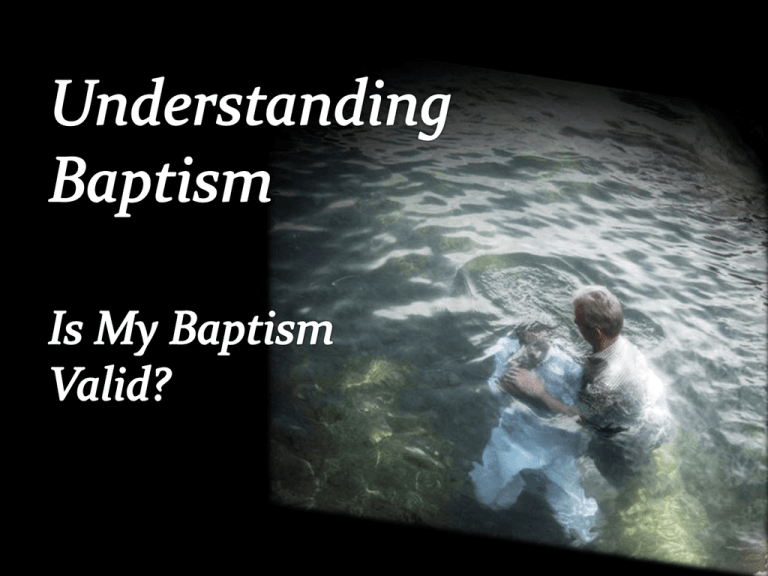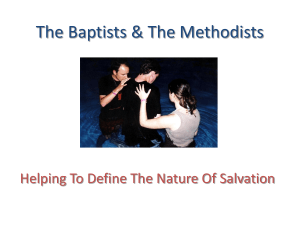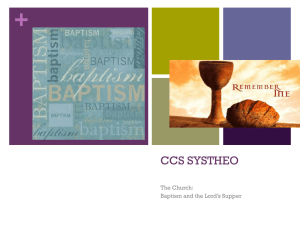Document
advertisement

John’s Baptism Prepared his hearers for the kingdom (Matt 3:1-3) Fruit of repentance (Luke 7:30) Purpose of God (Luke 7:30) Forgiveness in prospect of the Christ (Mk 1:4; Acts 19:4) Ephesus Disciples Believed strongly in the Christ Sincere God Seekers Baptized into John’s baptism Their baptism was still invalid Baptism = Immersion βάπτω means to “to dip in or under” (trans.): Hom. Od., 9, 392; Aesch. Prom., 863: …The intens. [βαπτίζω occurs in the sense of “to immerse” (trans.) from the time of Hippocrates, in Plato and esp. in later writers, a. strictly, act. βαπτίζειν τὸ σκάφος, “to sink the ship,” Baptism = Immersion Paul describes baptism as a “burial in Christ” (Rom 6:4; Col 2:12) When Christ was buried He was placed in the “heart of the earth” (Matt 12:40) The action of baptism in the New Testament was immersion (Acts 8:38-39) Water Baptism “See here is water, what hinders me from being baptized…” (Acts 8:36, 38) “Surely no one can refuse water for these to be baptized…” (Acts 10:47-48) This cannot refer to Holy Spirit baptism, water baptism is commanded Holy Spirit Baptism Direct outpouring in a miraculous way for confirmation and empowerment Miraculous gift, not a commandment Received by the Apostles and Cornelius (Act 1:5; 11:15-17) Baptism into Christ is never described as Holy Spirit baptism For Sinners Baptism is for those seeking forgiveness of sins (Mk 16:16; Acts 2:38, 22:16) Infants are not sinners and so do not need baptism The candidate must be convicted of sin For Sinners Required for those who have been taught the Gospel Baptism must be preceded by repentance Baptism must be received by a penitent believer in Christ Express Purpose Scripture expressly states baptism is for forgiveness of sins More than repeating words, the candidate must understand the purpose This understanding must precede baptism Acts 2:38 “Repent and let each of you be baptized” (NASB) This emphasizes the need for each individual to be baptized Repentance is active baptism is passive Argument “The command to repent is in the second person plural and the command to be baptized is in the third person singular” "Henry J. Cadbury, member of the Revised Standard Version Committee...has this to say... ‘The grammar of the sentence in Acts 2:38 is perfectly regular and better Greek than if the author had kept the second person plural ‘baptize’ after using the singular ‘each.’ I have no doubt that another author would have written ‘Do ye repent,’ and ‘be ye baptized,’ each of you…” Argument “The command to repent is in the second person plural and the command to be baptized is in the third person singular” Argument ” …But this writer seems to have preferred the less loose construction… I think that there would be no essential difference in meaning.’ Whether you said ‘Do ye repent, and be ye baptized each of you,’ or as it stands exactly, there would be no essential difference in meaning." (Warren/Ballard Debate, p.164) “The command to repent is in the second person plural and the command to be baptized is in the third person singular” Acts 2:38 “remission of sins” modifies both “baptism” and “repentance” The term “for” is not used in a causal sense but indicates purpose and literally means “in order to” or “so as to obtain” Argument “for the remission of sins” means “because of the remission of sins” Acts 2:38 “eis aphesin hamartion, to obtain the forgiveness of sins” (Thayer). “eis is defined as expressing ‘purpose,’ with the sense of ‘in order to,’ rendered the same phrase: “for forgiveness of sins, so that sins might be forgiven . . . Acts 2:38…” (BDAG) Argument ‘for the remission of sins’ means ‘because of the remission of sins’ Acts 2:38 “… eis, in Acts 2:38, is designed to indicate purpose” (Exegetical Dictionary of the New Testament, 1990, Vol. 1, 399). – “the “causal” use of eis in Acts 2:38 (i.e., “because of” instead of “in order to”) has been demonstrated to fail in terms of linguistic evidence.” (Greek Grammar Beyond the Basics p. 370). Argument ‘for the remission of sins’ means ‘because of the remission of sins’ From the Heart Obedience demands hearing and submission (Heb 5:9) Obedience is the natural expression of saving faith Baptism is described as “obedience unto righteousness” (Romans 6:16) Added to His Church In baptism we are not only saved we are also added to His church The Lord saves and adds simultaneously At the moment of baptism we are incorporated into His body We are not added to a denominational body











